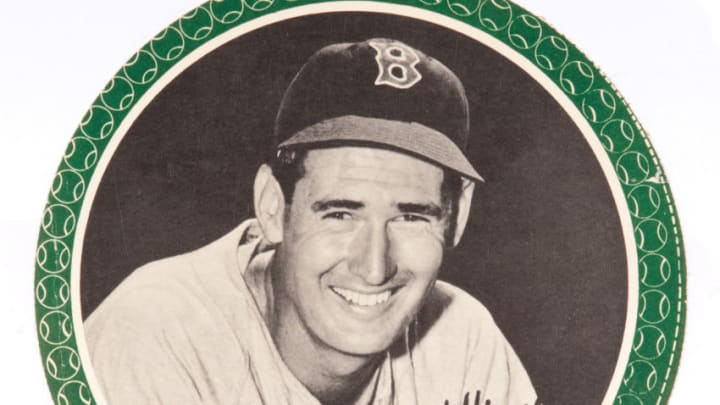Boston Red Sox legend Ted Williams fell short of the MVP several times.
The Most Valuable Player award will not be given to a Boston Red Sox player this season, but in the past, the Red Sox have been significantly represented and occasionally short-changed.
Carl Yastrzemski’s magnificent 1967 season was not a perfect score on the MVP voting despite a Triple Crown and the Red Sox dash from ninth in 1966 to the World Series. Max Nichols – a Minneapolis writer – gave his first-place vote to Cesar Tovar of the Twins who hit .267.
The most noted recipient of vindictive vitriol was Ted Williams. Williams was irascible and his love/hate relationship with the press was certainly far more on the hate side by both parties. In 1947, Williams lost out on the MVP ballot to Joe DiMaggio by a 202-201 tabulation. Mel Webb – a Boston writer – left “Teddy Ballgame” off his ballot completely. An amazing level of pure vindictiveness. Writers hold grudges and what better way to exact vengeance on a star player.
But Williams lost out in other years, also.
More from Red Sox History
- Two notable Red Sox anniversaries highlight current organizational failures
- Contemporary Era Committee doesn’t elect any former Red Sox to Hall of Fame
- Johnny Damon calls Red Sox out, reveals hilarious way he skirted Yankees’ grooming policy
- Remembering the best Red Sox Thanksgiving ever
- Red Sox World Series legends headline 2023 Hall of Fame ballot
In 1942, Williams won the Triple-Crown and the Red Sox managed a second-place finish to the New York Yankees. Williams cornered the market in just about every possible positive offensive category on his way to a remarkable 10.4 bWAR. Williams lost out to the Yankee’s second baseman Joe Gordon 270-249.
Gordon had a phenomenal season and closed with a 7.7 bWAR, but was also a Triple-Crown winner. Gordon led the American League in strikeouts (95), grounding into double plays (22), and errors at second base (28). Was it that “New York media” that was responsible? Ted’s behavior? The Yankees winning it all? Probably a combination of all three.
The 1941 season is one of interest since the two landmarks of the season were DiMaggio’s 56-game hitting streak and Williams’ hitting .406. Again the issue was a New York player since DiMaggio became MVP and Williams finished second – one of four times TSW finished as the bridesmaid. For 1941, Williams finished with a 10.4 bWAR to DiMaggio’s 9.4 fWAR, but the Yanks finished first with Boston in second place 17 games behind. Did DiMaggio have that much of an influence?
My first awakening at questioning MVP voting happened in 1958 and 1959 when Cubs shortstop Ernie Banks won both seasons. The Cubs were an awful team and I simply could not figure out how Banks deserved the award over Willie Mays in 1958 and Hank Aaron in 1959. In 1959, a case could be made based on WAR value and not so in 1958, but this is not the best player award, but MVP. Aaron was instrumental in keeping the Braves in the race only to lose a three-game playoff.
In 1958, the Red Sox and their five-tool outfielder were also the recipients of a questionable MVP. Jackie Jensen has a great season hitting 35 home runs and leading the AL with 122 RBI. Boston finished 79-75 which represented a slide from the 82 wins of 1957. The Yankees won the pennant and Mickey Mantle had 42 home runs, 97 RBI and a league-best 8.7 bWAR. Using modern metrics Jensen had a 4.9 bWAR that was well below Rocky Colavito (6.0) and Bob Cerv (6.7). Either using traditional or metric statistics, I have a difficult time creating a defense for Jensen winning especially on the team record. Jensen simply didn’t deserve the honor.
Did a late-season team slump in 2011 cost Jacoby Ellsbury the MVP? Ellsbury did everything possible in the last 27 games to keep the Red Sox afloat hitting nine home runs and batting .358. That season, Justin Verlander won the award and I have some concerns about pitchers winning it, but can understand the logic. Verlander went 9-0 down the stretch and the Tigers won their division so it is certainly argumentative, but with my Red Sox bias, I would have gone with Ellsbury.
I saw this situation arise with Mike Trout who is the best player in baseball and has been for about 10 seasons, but being the best does not mean the most valuable. In 2016, Trout was the best, but Mookie Betts contributed far more to his team’s success than Trout. The Angels did nothing (74-88) and the Red Sox won the division. Again the issue is an influence on just how the team finished.
This short season Red Sox fans have no horse in the race so we’ll be on the outside looking in. That said, Boston certainly has a few players in their prime or approaching their prime. Xander Bogaerts plays a key defensive position and provides excellent offensive numbers. I would expect Bogaerts and possibly Rafael Devers to be in the MVP mix the next several seasons especially if the Red Sox surge in 2021 to being relevant.
